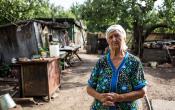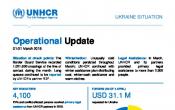Russian Federation
Operation: Russian Federation
Location
{"longitude":80,"latitude":59,"zoom_level":3,"iso_codes":"'RUS'"}
By clicking on the icons on the map, additional information is displayed.
Key Figures
| 2017 year-end results | |
| 8,970 | refugees, asylum-seekers and stateless people received assistance from UNHCR’s legal partners and independent asylum practitioners |
| 8,620 | stateless persons acquired Russian nationality (according to governmental statistics) |
| 340 | judicial and quasi-judicial positions were provided to courts (more than 100 compared to 2016), helping with the refugee status determination and citizenship processes. It led to more than 100 positive decisions |
| 254 | stateless individuals were assisted with obtaining permission for temporary stay, residence permits and citizenship |
| 86 | cases (111 individuals) were submitted for resettlement |
| 31 | people departed for resettlement |
| 2018 planning figures | |
| 100% | of cases of potential refoulement will be prevented |
| 100% | of applicants will have access to refugee status determination procedures |
| 90% | of people of concern will have access to national primary health care facilities |
| 11,500 | refugees and asylum-seekers and 4,000 stateless persons will receive legal assistance |
| 300 | Governmental staff will be trained on refugee status determination procedures |
Latest Updates and Related Links
People of Concern
23%
Decrease in
2016
2016
| 2016 | 322,856 |
| 2015 | 418,411 |
| 2014 | 354,450 |

[["Refugees",228990],["Asylum-seekers",3039],["Returned refugees",56],["Stateless",90771]]
Loading ...
Russian Federation
< Back
2017
{"categories":[2013,2014,2015,2016,2017,2018],"budget":[8.43188109,7.08626894,6.115651963,5.61137723,5.92628121,6.14848053],"expenditure":[5.96699989,4.81179465,3.81659835,4.32731972,4.61262595,null]}
{"categories":[2013,2014,2015,2016,2017,2018],"p1":[7.83837767,6.39498853,5.432067327,5.18089139,5.28343456,5.25529905],"p2":[0.59350342,0.69128041,0.683584636,0.43048584,0.64284665,0.89318148],"p3":[null,null,null,null,null,null],"p4":[null,null,null,null,null,null]}
{"categories":[2013,2014,2015,2016,2017,2018],"p1":[5.44928767,4.27754774,3.20615022,3.92720689,4.01735087,null],"p2":[0.51771222,0.53424691,0.61044813,0.40011283,0.59527508,null],"p3":[null,null,null,null,null,null],"p4":[null,null,null,null,null,null]}
Loading ...
CHOOSE A YEAR
- 2014
- 2015
- 2016
- 2017
- 2018
Operational context
In 2017, UNHCR continued to operate in a complex environment in the Russian Federation. Transfer of the functions from the Federal Migration Service (FMS) to the Ministry of the Interior along with Russia’s more restrictive migration policies were the critical changes that affected the situation of UNHCR’s people of concern. National and regional security has shaped strongly all legislation and policy-making, including regional such as the Commonwealth of Independent States (CIS) and the Collective Security Treaty Organization (CSTO).The Government continued to lead and manage the operational response for refugees and asylum-seekers from Ukraine.
Non-Ukrainian asylum-seekers experienced administrative penalties including initiation of expulsion procedures instead of registering asylum claims; longer waiting periods; absence of identity cards and documents confirming their legal stay in Russia; and hampered access to the asylum procedure and public services.
UNHCR and its partners provided legal support to regularize the status of stateless persons; worked with the Ministry of Interior and partners to map and assist stateless persons in detention; and implemented several awareness-raising activities. The 2012 amendment to the Citizenship Law extended the deadline for simplified naturalization for certain categories of stateless persons from the former Soviet Union until 1 January 2020.
Population trends
The Russian Federation hosted some 126,000 registered refugees, including 123,600 Ukrainians, 1,130 Syrians and some 660 Afghans. Approximately 800,000 Ukrainians enjoyed other forms of legal stay.Since January 2014, close to 449,500 Ukrainians have applied for temporary asylum in the Russian Federation. In 2017, some 9,680 Ukrainians received temporary asylum.
At the end of 2017, an estimated 82,000 stateless persons were living in the Russian Federation.
Key achievements
- UNHCR strengthened litigation of individual cases in order to prevent refoulement. The Office implemented a number of capacity-building initiatives for Ombudsmen’s Offices and NGOs to strengthen the protection of refugees and stateless persons.
- UNHCR increased its presence in refugee communities, with the aim of mapping needs and capacities, as well as raising awareness of UNHCR’s and partners’ activities. This was done through engaging with communities and partners, regular participatory assessments and publication of a simplified brochure available assistance to people of concern.
- In order to increase opportunities for local integration of people of concern, UNHCR continued supporting two community centres in the Moscow region for Syrian refugees, as well as a refugee reception centre in Moscow and an integration centre in Saint Petersburg for other nationalities. Among a variety of activities, the centres provide Russian language classes and support in job search. In 2017, courses in sewing, hair-dressing and manicure were organised in Moscow and Saint Petersburg.
Unmet needs
- Limited outreach capacity (both financial and geographical) as well as the transfer of functions to the Ministry of Interior, due to which UNHCR will have to visit and negotiate with every region hosting people of concern, hampered UNHCR’s ability to map out and assist more thoroughly the people of concern in the Russian Federation.
- UNHCR was only able to cover 20, out of 38, counselling points in Russia run by the NGO Memorial. With decreased funding, Memorial is losing some of the counselling points, which results in decreasing legal support to people of concern and less information available on the asylum situation in the country.
- With the overall economic decline, the number of refugees approaching UNHCR for assistance increased in 2017. Most of them had to rent one room for 5-10 people in substandard living conditions, resulting in poor hygiene and leading to further deterioration of health among the population. However, UNHCR’s financial and health assistance was still very limited to only extreme vulnerable cases.
Working environment
Since the outbreak of the conflict in south-eastern Ukraine in April 2014, some 1.1 million Ukrainians had sought asylum or other forms of legal stay in the Russian Federation by July 2016. The Government continues to lead the operational response to the needs of arrivals from Ukraine.Newly-arrived asylum-seekers from countries other than Ukraine sometimes face difficulties with access to territory and to asylum procedures. They also experience longer waiting periods and are exposed to risks associated with the absence of documentation, including deportation. Furthermore, decisions on their status often prioritize the Temporary Asylum status as a form of complementary protection over refugee status even in cases when the applicant may meet the definition set in the 1951 Convention relating to the Status of Refugees.
Similarly, while local integration is generally an option available to Ukrainian refugees, it remains problematic for other population groups due to absence of governmental programmes to assist refugees with accommodation, jobs, language, and overcoming legal/bureaucratic obstacles, as well as incidents of xenophobia.
Access to education remains challenging for refugees and asylum-seekers due to the regulation requiring registration at the place of sojourn for admission to local schools.
UNHCR will continue working with the authorities to improve access to and quality of the national status determination procedure and promote integration opportunities for recognized refugees and temporary asylum holders. UNHCR ensures individual legal assistance and counselling through partner organizations and lobbies for individual cases before national courts and, in selected cases, with the European Court for Human Rights. In addition, the Office pursues resettlement to third countries when refugees, for various reasons, cannot find protection and achieve integration in the Russian Federation.
By law, applicants for refugee status, holders of temporary asylum and refugees in the Russian Federation are entitled to free medical care. However, UNHCR also provides assistance through its partners to applicants who face difficulties accessing this entitlement or who have serious health problems that are not covered by the obligatory insurance.
The number of stateless people in the country is progressively reducing, thanks to a number of legislative changes. However the problem has not yet been fully resolved and the estimated stateless population stands at just over 100,000. UNHCR continues to implement awareness-raising activities and to provide legal assistance through partner organizations for people seeking to regularize their status, and stands ready to provide relevant support to the Government.
Key priorities
In 2017, UNHCR's Operation will focus on:• Promoting unhindered access to the territory for asylum-seekers, especially from international airport transit zones and land borders, including through the establishment of cooperation with the Border Guards Service;
• Working with migration service staff to improve reception conditions and temporary accommodation centres;
• Providing capacity building for government officials to ensure access to quality RSD procedures and individual documentation;
• Building partners’ capacity to provide quality legal services to asylum-seekers, refugees and stateless people;
• Supporting the Government in developing integration programmes for recognized refugees and temporary asylum status holders, while promoting the removal of legal and practical barriers to integration;
• Lobbying the Government for its accession to international instruments, as well as legislative amendments to further reduce and prevent statelessness.
• Lobbying authorities to facilitate naturalization procedures for refugees and stateless people and advocate for their access to social services.

